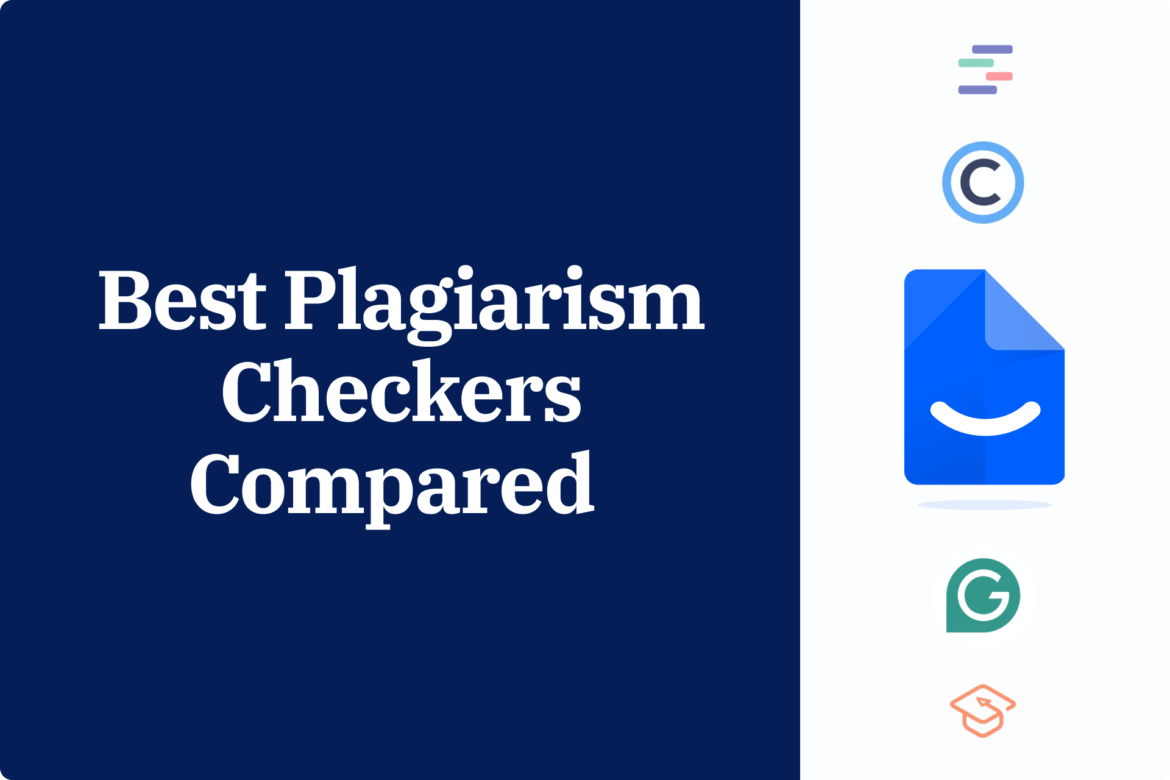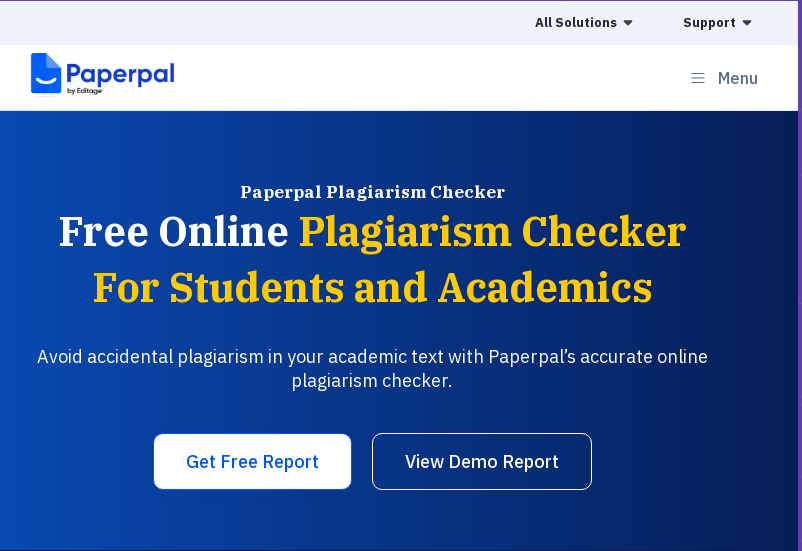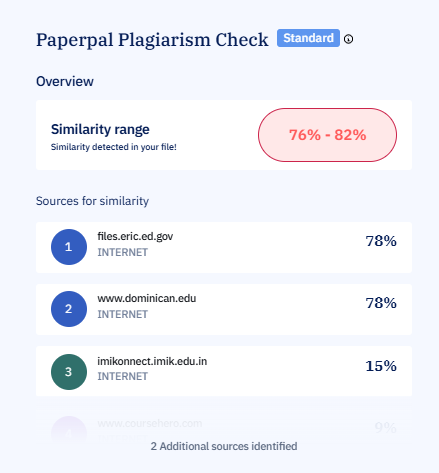Table of Contents
The risk of accidental plagiarism has grown exponentially, with students and researchers increasingly relying on AI tools for academic writing. To address this ethical issue, it has become essential to use a reliable free plagiarism checker to check your essays, thesis, dissertations, or research papers for missing citations, quotation marks, or inadequately paraphrased text. In this article, we analyze 7 plagiarism detection software to evaluate their capabilities, accuracy, and ease of use, empowering authors with insights needed to choose the best plagiarism checker to ensure their work is authentic and original.
Disclaimer: This article is based on independent research and is intended to provide an unbiased comparison of various AI writing tools, including our own. While we strive to present accurate and up-to-date information, features, and pricing, we recommend checking directly with the respective companies for the latest details, as offerings may change over time. Additionally, any opinions expressed here reflect the author’s perspective and may not represent the official stance of the companies/tools discussed.
What is Plagiarism, and How Do Plagiarism Checkers Work?
Plagiarism occurs when you use or present someone else’s work, ideas, or words as your own without properly attributing it to the original source. In academic settings, this can severely undermine intellectual integrity and scholarly contributions.
Plagiarism checkers scan text against a vast database of published works, academic papers, and online content. They detect similarities and flag potential instances of plagiarism, allowing authors to review and properly cite sources.
In academic writing, highlighted instances include direct quotes, rephrased concepts, and even commonly used phrases that are used without proper attribution. By ensuring originality, plagiarism checkers uphold academic standards and ethical writing practices.
Plagiarism Checker vs Similarity Checker
While the terms “plagiarism checker” and “similarity checker” are often used interchangeably, they refer to slightly different concepts, particularly in an academic context.
| Plagiarism Checker | Similarity Checker |
| Purpose: Identifies instances of plagiarism by detecting copied or closely paraphrased text without proper attribution. | Purpose: Focuses on identifying similarities between texts, which may include common phrases, terminology, or widely accepted facts. |
In this detailed article, we will review popular plagiarism detection software and tools available, with a focus on academic writing. This includes Paperpal, Scribbr, Grammarly, Quetext, Copyleaks, Smodin, and Plagscan, evaluating them on the basis of their features and capabilities, pricing models, and who each plagiarism checker is most beneficial for.
Paperpal Plagiarism Checker Review
Paperpal’s plagiarism checker is integrated into the comprehensive all-in-one AI academic writing assistant. Paperpal’s reliable plagiarism detection software. It allows users to scan their academic text against an extensive database of 99 billion web pages, including 200 million open-access research articles, as well as essays, theses, dissertations, and more. The plagiarism checker detects similar phrasing and instances of synonym swapping and provides a detailed plagiarism report with a similarity score, side-by-side comparisons, and color-coded results that help you quickly identify problem areas in your writing.
Key Features
- Trusted plagiarism prevention: Paperpal’s plagiarism checker analyzes text against 97% of top publications so you can quickly identify and avoid accidental or self-plagiarism.
- Detailed plagiarism report: Provides a detailed report in minutes with a similarity score, links to similar sources, and color-coded results to help you quickly understand and address problem areas in your text.
- Multiple file formats: Paperpal’s plagiarism checker allows you to upload your work files in .doc, .docx, and PDF formats and check your writing for potential plagiarism.
- 100% data security: Authors own full copyright over their work. Paperpal will never use your data to train its AI and has strict security and privacy measures to keep your work safe.
- Free report available: Users can scan up to 7,000 words or ~25 pages of academic text at no cost (free limit resets every month). The paid subscription unlocks a comprehensive report, additional words, and the option to purchase additional credits for longer text.
- Comprehensive checks for academic writing: Apart from being a trusted plagiarism checker, Paperpal also provides 30+ pre-submission manuscript checks and AI peer review for free, and a human editor review (Prime feature)
- Complete writing assistance: In addition to its trusted plagiarism checker, Paperpal also addresses problem areas with real-time support for writing, paraphrasing, word reduction, language editing, correcting academic tone, and citing sources directly from its growing repository of 250Mn+ research articles.
Pricing
Paperpal’s pricing options ensure its plagiarism checker is freely accessible to all. The free plan allows users to scan up to 7,000 words per month, approximately 25 pages, through their plagiarism detection software, which then delivers a report with a similarity score and matching sources.
With the Paperpal Prime subscription, users can check up to 10,000 words per month, approximately 36 pages, and get an in-depth plagiarism report with color-coded results and side-by-side comparisons. Paid subscribers also have the option to purchase an additional 50,000 words at a special price.
Paperpal Prime is priced at $25/month, $55/quarter, and $139/year, respectively.
| Pros | Cons |
| Industry-leading plagiarism check, highest accuracy with 90% similarity detection in academic text | Limitations on the free plan; users need to buy a Prime plan to check over 7,000 words a month |
| Scans text for plagiarism against a database of 99Bn+ webpages, including 200Mn+ open-access research articles | |
| Trusted plagiarism prevention checks used by educators and institutions worldwide cover 97% of top publications. | |
| Easy-to-understand reports with similarity scores, color-coded results, and side-by-side comparisons for quick revisions where needed. | |
| Paperpal never uses your data to train its AI and has stringent security and privacy measures to keep your work 100% safe. | |
| Free plagiarism report is an excellent option for students and academics on a budget. |
Who should use Paperpal’s plagiarism checker?
Paperpal blends 22+ years of scientific, technical, and medical publishing expertise with advanced AI to enhance every step of the academic writing process. Built for academics, it has emerged as a secure, trusted, comprehensive AI writing assistant for students, researchers, medical professionals, educators, editors, science journalists, and other academic professionals.
Paperpal leverages an extensive database to provide its users with the best plagiarism checker and a reliable way to avoid accidental plagiarism and maintain academic integrity.
Scribbr Plagiarism Checker Review
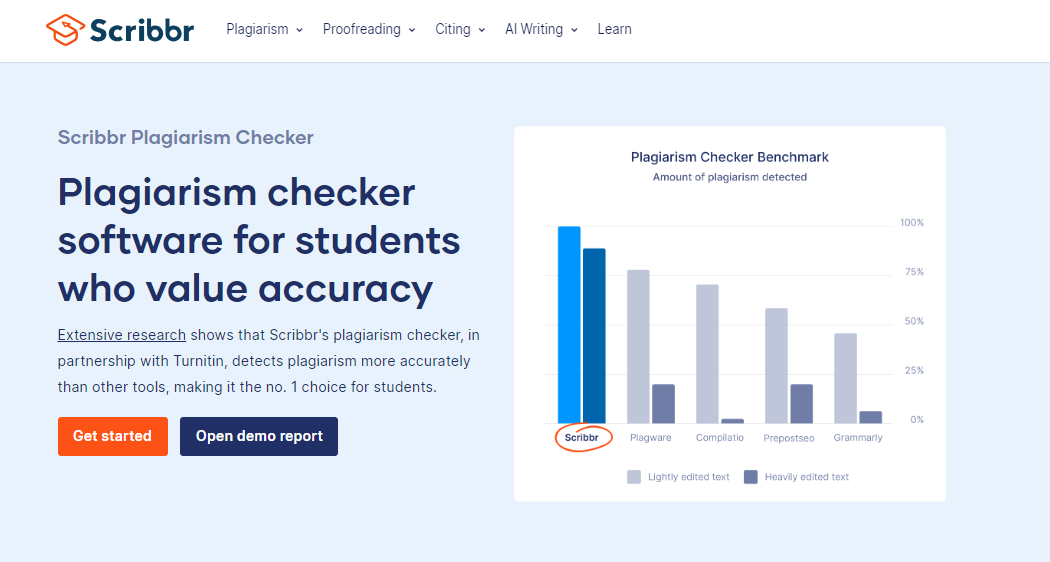
Scribbr Plagiarism Checker
Scribbr offers a thorough plagiarism prevention check. Known for its high accuracy, Scribbr uses advanced algorithms to analyze text structure and meaning, enabling the detection of paraphrased content even with significant wording changes.
Key Features
- Comprehensive plagiarism checker: Provides a detailed plagiarism checker with access to an extensive database of online sources.
- Comprehensive Reports: Scans text and provides a downloadable report that highlights similar text-matched content and provides source links.
- Data Privacy: Scribbr plagiarism checker does not store documents after checking, ensuring user confidentiality.
Pricing
Scribbr has a pay-per-use model, with prices for the plagiarism checker starting at $19.95 for 7,500 words, $29.95 for up to 50,000 words, and $39.95 for 50,000+ words. Scribbr does not allow users to recheck documents for free, but it has a somewhat limited free version of the plagiarism checker.
| Pros | Cons |
| Highly accurate plagiarism detection software | Limited free version; plagiarism checker prices are more expensive than other alternatives (it does not allow free rechecks) |
| Comprehensive checks against an extensive database of online sources | Plagiarism checker options and reports may be overwhelming for beginners |
| Simple interface with good customer support | Users cannot work directly in the tool; some users also report slow processing times |
| Pay-per-use pricing system based on word counts | |
| Secure platform, does not store documents long term after checking for plagiarism | |
| Happiness guarantee ensures users get a refund or new check if they are unsatisfied |
Who should use Scribbr’s plagiarism checker?
Scribbr plagiarism checker is beneficial for students, researchers, and academic professionals who need a reliable plagiarism checker to meet academic integrity standards.
Grammarly Plagiarism Checker Review
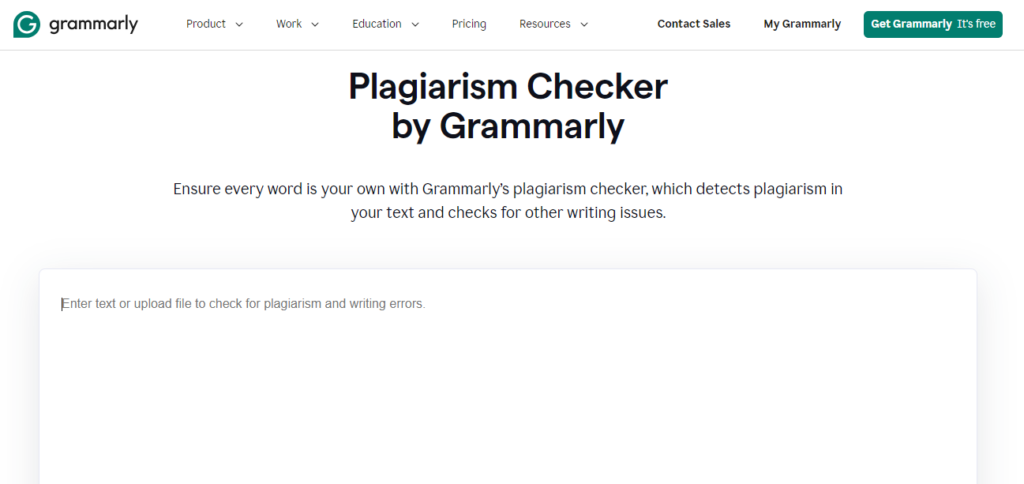
Grammarly Plagiarism Checker
Grammarly’s plagiarism checker is an integrated feature available with the Grammarly Premium subscription. It scans your written documents against billions of webpages, academic papers, and research articles in the ProQuest database to identify potential instances of plagiarism.
Key Features
- Extensive Database Comparison: Grammarly checks submitted text against ProQuest’s database of 16 billion webpages.
- Real-Time Feedback: The plagiarism checker provides real-time feedback as users write. This helps users maintain a smooth writing flow without needing to run a separate check after completing their work.
- Originality Score: Grammarly’s plagiarism report includes a similarity percentage based on content matches with other sources.
- Source Links: The plagiarism checker also provides links to the original sources to check for missed citations and reference them.
- Support for multiple formats: Grammarly plagiarism checker supports .doc, .docx, and PDF file formats
- Additional Writing Support: Grammarly also has generative AI features that allow users to paraphrase plagiarized text and avoid direct copying.
Pricing
While Grammarly has a limited free version of its plagiarism checker, it is integrated with other writing checks. The dedicated plagiarism checker is a premium feature that is only available with a paid subscription, with prices starting at $12/month.
| Pros | Cons |
| Detects plagiarism by scanning text against 16 billion webpages in the ProQuest database | Not very accurate; may return false positives for common phrases, only partial matches of text |
| Offers an originality score, source links to quickly compare text, and suggestions to fix problem areas | Same colors used for different sources, making it hard to interpret |
| Free checks of up to 10,000 characters to identify plagiarism and other writing issues | Full access available as premium-only feature, only works for content written in English |
| Plagiarism checker is integrated with a citation assistant, and a grammar and proofreading tool | Has character limits based on document size and chosen plan; users have to break text up in parts and check |
| Grammarly plagiarism checker does not store your work and restricts third-party access to keep your work secure. | Slow processing times for documents with over 1,000 words.
|
Who should use Grammarly?
Grammarly’s plagiarism checker is suitable for a diverse audience, including students, content creators, business professionals, non-native English speakers, and individuals seeking to improve their writing skills. But it is the best plagiarism checker for academics? No! It does not offer the accuracy required to avoid plagiarism in academic writing, which specialized tools like Paperpal are more suited for.
Quetext Plagiarism Checker Review
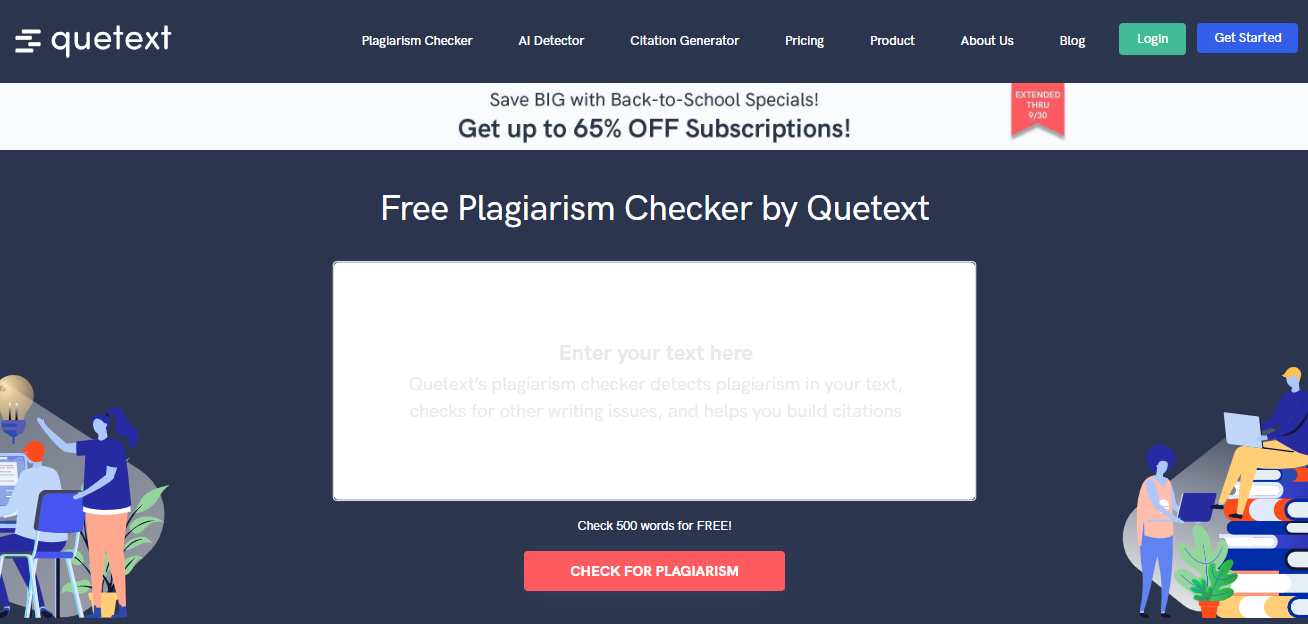
Quetext Plagiarism Checker
Quetext leverages its proprietary DeepSearch technology to effectively identify plagiarism in various forms of writing. It assess key factors like word placement, sentence structure, and the overall flow of the content to identify potential plagiarism.
Key Features
- DeepSearch Technology: Quetext plagiarism checker, powered by DeepSearch, allows the AI tool to detect plagiarism by analyzing context, the use and position of words, and sentence structure instead of relying solely on exact phrase matches.
- Color-Graded Feedback: Quetext provides a score and uses a color-grading system to highlight potential plagiarism. For example, orange indicates partial matches, while red signifies full text matches.
- Citation Assistant: The built-in Cite Source tool helps users address flagged issues faster; it generates citations for matched sources with an option to directly insert these in text.
- Document Privacy: Quetext does not store or sell user documents, ensuring your work remains private and secure.
- Bulk Uploads: Users can upload multiple documents at once on Quetext, streamlining the plagiarism-checking process for larger projects.
Pricing
Quetext has a free trial that allows users to check up to 500 words for plagiarism. After the trial, users must subscribe to a premium plan starting at about $8.25 per month; this includes checks for up to 100,000 words and access to additional features such as the citation assistant and detailed reports.
| Pros | Cons |
| Effective for basic plagiarism detection | Not very accurate; partial matching can lead to false positives |
| User-friendly interface with color-coded feedback | Users complain about major formatting changes, difficulty in reading color-grading system which makes it hard to identify critical problem areas |
| Built-in citation assistant to help with missing citations available with paid plans | Limited effectiveness for academic sources |
| Does not store user documents uploaded on the plagiarism checker tool | Free version has significant limitations; monthly subscription required to unlock all features |
Who should use Quetext’s plagiarism checker?
Quetext works well for students and content creators looking to quickly identify and avoid plagiarism in their work. However, users have reported accuracy errors, particularly with partial matches and their performance when it comes to scholarly sources. Here, students looking for a comprehensive plagiarism checker will find Paperpal more effective to check academic text.
Copyleaks Plagiarism Checker Review
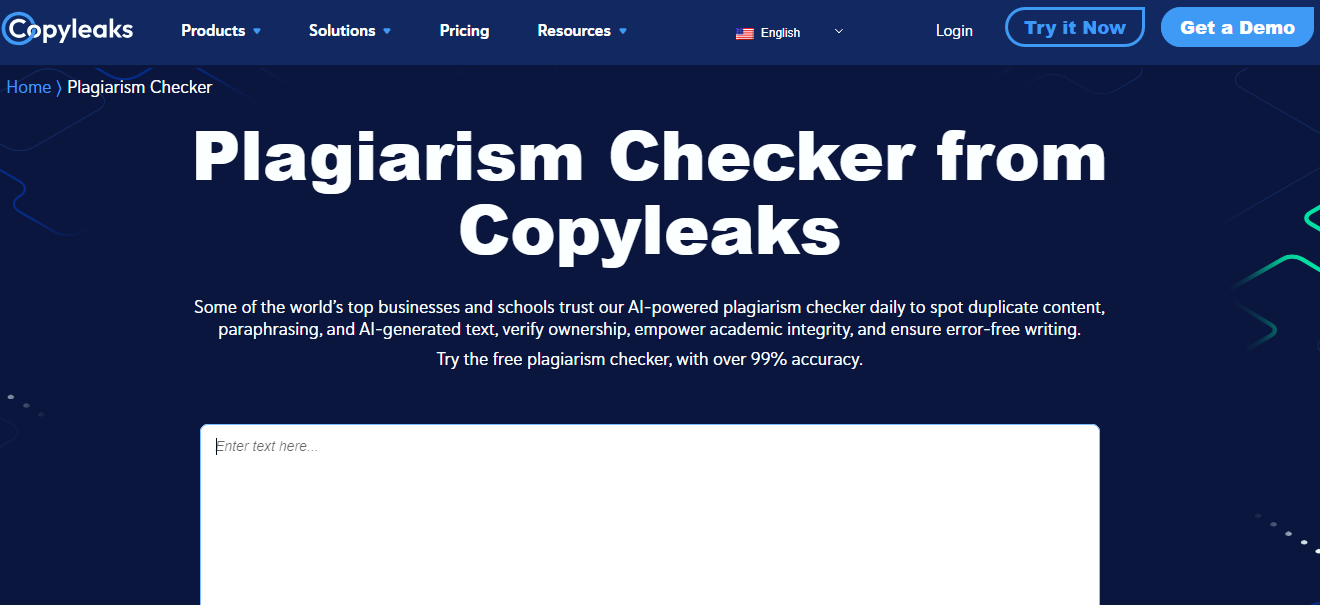
Copyleaks Plagiarism Checker
Copyleaks detects instances of plagiarism, including copied content, paraphrased text, and AI-generated material. On its website, the plagiarism detection software claims to achieve up to 99.12% accuracy in detecting AI-generated text with a false positive rate of just 0.2%. This minimizes the likelihood of human writing being incorrectly flagged as AI-generated text.
Key Features
- Advanced Real-Time Detection: Copyleaks can identify plagiarism as it happens, which is particularly useful for businesses and organizations wanting to protect their content from unauthorized use.
- Multiple Language Support: This tool supports over 100 languages, making it suitable for international clients and users creating content in various languages.
- Customizable Settings: Users can adjust the sensitivity of the plagiarism detection and exclude specific sources, allowing for a tailored scanning experience.
- API Integration: Copyleaks offers an API that enables organizations to integrate its plagiarism detection capabilities into their existing systems, such as learning management systems (LMS) like Blackboard and Canvas.
- Comprehensive Reporting: After scanning, Copyleaks provides detailed reports that highlight similarities, including percentage matches and links to original sources, facilitating easy revision and citation.
Pricing
Copyleaks offers separate plans for AI and Plagiarism detection, starting from $9.99/month and $10.99/month, respectively. The annual plan, priced at $167.88, offers both AI and plagiarism detection.
| Pros | Cons |
| Accurate plagiarism detection with customizable settings for tailored results | May require adjustments for optimal sensitivity settings |
| Supports multiple languages, making it perfect for non-native English speakers | Some users report issues with unsupported formats |
| API integration for seamless plagiarism checks within your writing workflows | Slow processing times for large documents and bulk uploads |
| Limited live support channels |
Who should use Copyleaks plagiarism checker?
Copyleaks can be a good plagiarism checker for students, educational institutions, legal and compliance professionals, and business and marketing professionals. With separate tools to detect plagiarism and AI-generated content, it helps you maintain originality in your writing.
Smodin Plagiarism Checker Review
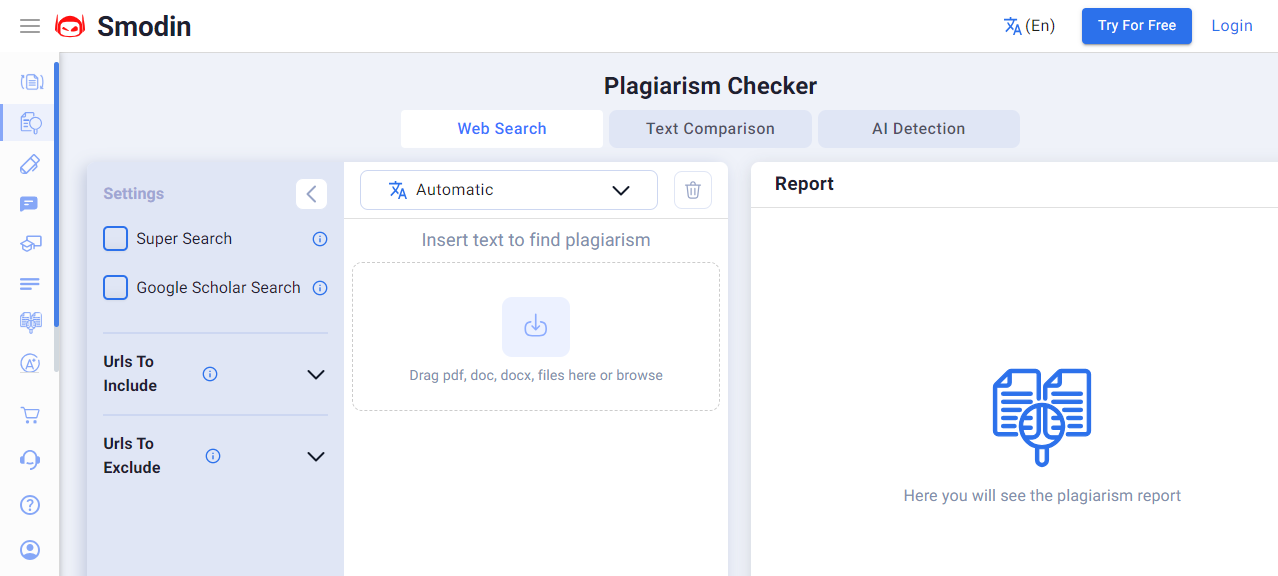
Smodin Plagiarism Checker
Smodin is a solid choice for a basic plagiarism checker, especially for those on a budget. This plagiarism checker compares submitted text against a database of webpages and online sources and generates a report with the overall percentage of matching content. The report highlights specific phrases or sentences that match external sources.
Key Features
- Plagiarism Detection: Scans your text for similarities against millions of online sources and documents, with options for customized checks.
- Citations Assistance: Integrated with a feature that allows users to generate and add proper citations to avoid plagiarism and ensure authentic writing.
- AI Content Detection: Offers access to a tool that checks your text for AI-generated content and provides a percentage score so you can paraphrase as needed.
- Multi-Language Support: Checks documents in 100+ languages
- Mobile-Friendly Tool: Users can access Smodin’s features on any Android or iOS device apart from desktop or laptop.
Pricing
Smodin’s free plagiarism checker allows users to scan up to 1,500 characters. Paid plans, ranging from $15/month to $79/month, offers unlimited plagiarism checks, AI detection, rewrites, summaries, etc.
| Pros | Cons |
| Plagiarism detection with customizable checking options | Performs poorly with scholarly sources; more suited for generic text |
| Quick scanning against millions of webpages with immediate feedback | Scans individual sentences rather than full texts, which could be misleading |
| Allows access to AI content detection and citation support tools | Not very accurate; high occurrence of false positives for AI-generated text results |
| Provides plagiarism checks for 100+ languages | Limited word limit for every scan in free version; users need to choose paid plans for unlimited use |
Who should use Smodin plagiarism checker?
Smodin is an affordable plagiarism checker for students, content creators, businesses, and multilingual users looking for basic checks. However, due to its sentence-level scanning and limitations per scan, it might not be a viable option for researchers, medical professionals, and other academics who often scan large chunks of text and rely on high accuracy.
Plagscan Plagiarism Checker Review
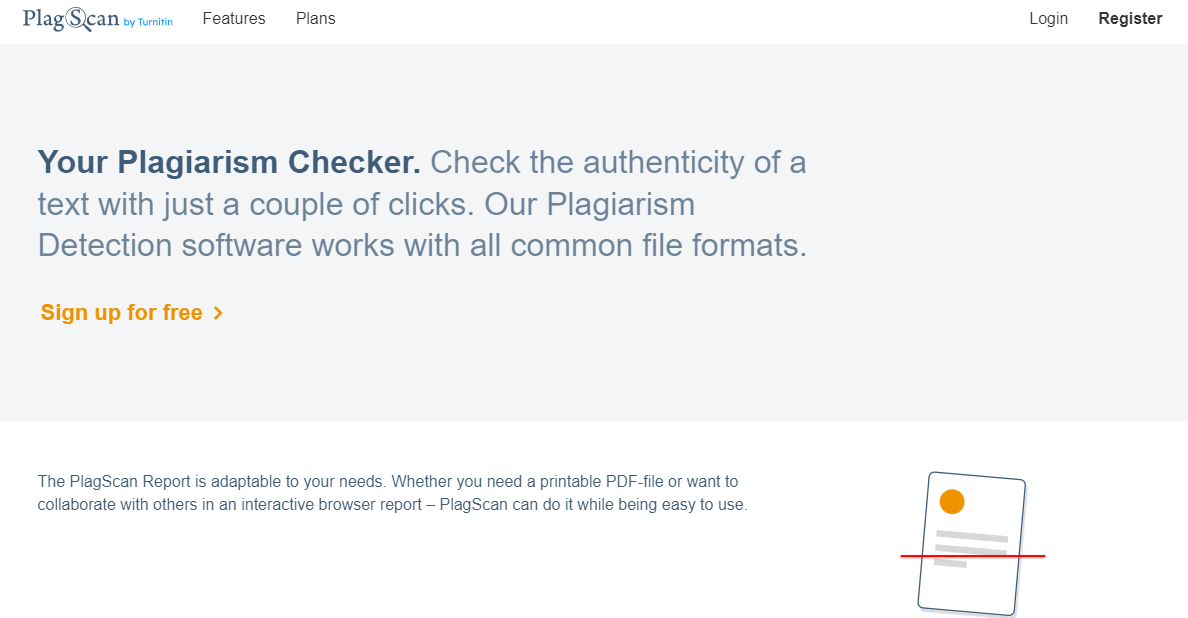
Plagscan Plagiarism Checker
Plagscan by Turnitin is a comprehensive plagiarism checker that employs a sophisticated two-step plagiarism-checking algorithm to detect similarities in uploaded content. This plagiarism prevention tool detects direct copying, paraphrasing, and matching sentence structures.
Key Features
- Multiple File Format Support: Users can upload their documents for plagiarism checks in various formats, including .doc, .docx, PDF, plain text, and more.
- Side-by-Side Text Comparison: Plagscan plagiarism report allows users to review their text alongside matched sources to quickly check similarities and flagged issues.
- Interactive Reports: Users can opt to download detailed plagiarism reports that highlight duplicated text, provide links to original sources, and include a similarity percentage or choose to collaborate with others on the interactive browser report.
- Focus on Data Security: Plagscan has access restrictions, which means that your work will never be shared without permission. You also retain full control over your documents and can choose when and if to delete them.
Pricing
Plagscan offers a variety of plagiarism detection packages. Users can choose one or a combination of plans with prepaid, pay-per-use prices ranging from $5.99 for 6,000 words to $49.99 for 100,000 words.
| Pros | Cons |
| High accuracy in plagiarism detection for any human-written text | Struggles with accurate plagiarism detection for AI-generated or paraphrased content |
| Multiple file format support | Extremely slow processing time |
| Quick review with categorized similarity sources and access to Plagiarism Prevention Pool to check your work against other user uploads | No additional paraphrasing or grammar checks to help address problem areas |
| Secure platform that keeps your work private and confidential | User data and documents are saved in the archive, unless you delete it/opt out |
Who can use Plagscan plagiarism checker?
Plagscan is an affordable plagiarism checker that allows students flexible options when it comes to checking their assignments, essays, and other texts. However, slow processing times can be a major issue when scanning large chunks of text for plagiarism.
How to Choose the Best Plagiarism Checker for Academic Writing?
Even accidental or self-plagiarism entails severe repercussions in the academic domain. Hence, a reliable plagiarism checker is a must-have part of any text-related workflow. When choosing the best plagiarism checker for academic writing, it’s crucial to ensure that a tool aligns with the needs of students, researchers, scientists, medical professionals, etc. Here’s a guide based on our experience to choose the best plagiarism checker for research:
- Comprehensive Content Repository: The best plagiarism checker should have a vast, diverse database of webpages, academic journals, books, and other scholarly sources. Plagiarism tools like Paperpal, which checks your work against a database of 99 billion webpages covering 97% of top publications, significantly reduces the risk of undetected plagiarism.
- Detection of Paraphrased and AI-Generated Text: A reliable plagiarism checker should be able to detect not just verbatim copying, but also subtler forms of plagiarism, including AI-generated content or paraphrased passages that lack proper attribution. This level of plagiarism detection ensures a thorough check for any form of misconduct and cheating.
- Clear Reporting: A good plagiarism checker should provide clear, detailed reports that highlight instances of potential plagiarism and specify sources where text matches were found. For instance, Paperpal provides easy-to-read plagiarism reports with a similarity score, color-coded results, side-by-side comparisons and suggestions to address potential red flags.
- Integrated Citation Assistance: The best plagiarism checkers will also have citation support. This helps in quickly addressing instances of potential plagiarism by attributing sources correctly and in the right style, which further helps maintain academic integrity.
- Integrated Writing and Editing Support: Plagiarism checkers like Paperpal also offer integrated writing and language editing assistance, along with in-built search and cite features, making it the best plagiarism checker and all-in-one academic writing tool.
While Paperpal stands out as the best plagiarism checker for academics, Scribbr and Grammarly are also highly regarded for their plagiarism detection capabilities and ease of use. Always consider your specific needs and budget to find the best fit for research and academic writing purposes.
Frequently Asked Questions
Can I use a plagiarism checker for research?
Which is the best plagiarism checker for research?
- To produce your best original academic content: Paperpal is the perfect choice; its deep domain expertise and comprehensive feature suite, including accurate plagiarism checks against Turnitin’s extensive database, makes it the best plagiarism checker for academics.
- To avoid plagiarism issues in everyday writing: Grammarly and Quetext are great options for easy and quick plagiarism checks, especially for those looking for additional writing support.
- To quickly check short text for plagiarism: Copyleaks or PlagScan may be more suitable for those looking for flexibility and processing text in batches as they write.
- To ensure accurate, affordable plagiarism detection: Look for trusted tools that offer maximum free checks. Here, Paperpal is the best plagiarism checker, processing up to 7,000 words for free every month and providing a reliable report based on Turnitin’s plagiarism detection software.
How to use a plagiarism checker ethically in academic writing?
- Understand What Constitutes Plagiarism: Familiarize yourself with the different forms of plagiarism, including direct copying, paraphrasing without credit, and using others' ideas without attribution. This understanding will help you recognize the importance of originality in your work and the role of plagiarism checkers in preventing academic dishonesty.
- Review and Interpret Results Carefully: Plagiarism detection tools may produce false positives, flagging common phrases or well-known facts as potential plagiarism. Review results critically and determine whether the flagged content genuinely constitutes plagiarism or if it is simply a legitimate use of common knowledge/phrases.
- Ensure Privacy and Confidentiality: Be mindful of the security and privacy measures when using plagiarism checkers, especially those that store or share your documents. Ensure that the tool you choose has a clear data policy and does not retain or use your work without your consent.
- Cite All Sources Appropriately: Use plagiarism checkers to identify missing citations. If the tool highlights text that matches other sources, ensure that you provide proper attribution.
- Follow Institutional/Journal Guidelines: Adhere to your institution's or journal’s policies on plagiarism and the use of plagiarism detection tools to navigate ethical dilemmas effectively. Many academic institutions and publishers have specific guidelines regarding how to use these tools and the consequences of academic dishonesty.
- Check Your Work Before Submission: Always run your writing, and its revised versions, through a plagiarism checker before submitting it. This step helps ensure that your work is original and that you have appropriately cited all sources.
Paperpal is a comprehensive AI writing toolkit that helps students and researchers achieve 2x the writing in half the time. It leverages 22+ years of STM experience and insights from millions of research articles to provide in-depth academic writing, language editing, and submission readiness support to help you write better, faster.
Get accurate academic translations, rewriting support, grammar checks, vocabulary suggestions, and generative AI assistance that delivers human precision at machine speed. Try for free or upgrade to Paperpal Prime starting at US$19 a month to access premium features, including consistency, plagiarism, and 30+ submission readiness checks to help you succeed.
Experience the future of academic writing – Sign up to Paperpal and start writing for free!


